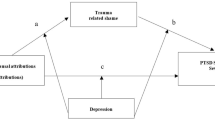Abstract
Guilt about surviving a traumatic event is thought to be an associated feature of posttraumatic stress disorder (PTSD). Shame is an emotion closely related to guilt but is a distinct affective state. Little is known regarding the role of shame in PTSD and there are no studies of PTSD where shame and guilt are examined simultaneously. We used a measure of shame- and guilt-proneness in 107 community residing former prisoner of war veterans all of whom had been exposed to trauma. The measure of shame-proneness was positively correlated with PTSD symptom severity whereas guilt-proneness was not. This study provides the first empirical data regarding a possible role for shame in PTSD and may have important therapeutic and theoretical implications.
Similar content being viewed by others
References
American Psychiatric Association. (1980). Diagnostic and statistical manual of mental disorders (3rd ed.). Washington, DC: Author.
Blanchard, E. B., Jones-Alexander, J., Buckley, T. C., & Forneris, C. A. (1996). Psychometric properties of the PTSD checklist (PCL). Behavior Research and Therapy, 34, 669–673.
Brett, E. A., Spitzer, R. L., & Williams, J. B. (1988). DSM-III-R criteria for posttraumatic stress disorder. American Journal of Psychiatry, 145, 1232–1236.
Engdahl, B., Dikel, T. N., Eberly, R., & Blank, A., Jr. (1997). Posttraumatic stress disorder in a community sample of former prisoners of war: A normative response to severe trauma. American Journal of Psychiatry, 154, 1576–1581.
Fontana, A., Rosenheck, R., & Brett, E. (1992). War zone traumas and posttraumatic stress disorder symptomatology. Journal of Nervous and Mental Disease, 180, 748–755.
Frazier, P. A. (1990). Victim attributions and post-rape trauma. Journal of Personality and Social Psychology, 59, 298–304.
Glover, H. (1984). Survival guilt and the Vietnam veteran. Journal of Nervous and Mental Disease, 172, 393–397.
Glover, H., Pelesky, C. A., Bruno, R., & Sette, R. (1990). Post-traumatic stress disorder conflicts in Vietnam combat veterans: A confirmatory factor analytic study. Journal of Traumatic Stress, 3, 573–591.
Gramzow, R., & Tangney, J. P. (1992). Proneness to shame and the narcissistic personality. Personality and Social Psychology Bulletin, 18, 369–376.
Hovens, J. E., Falger, P. R., Op Den Veide, W., & Meijer, P. (1993). A self-rating scale of posttraumatic stress disorder in Dutch resistance veterans in World War II. Journal of Clinical Psychology, 49, 196–203.
Janoff-Bulman, R. (1979). Characterologic versus behavioral self-blame: Inquiries into depression and rape. Journal of Personality and Social Psychology, 37, 1798–1809.
Keane, T. M., Fairbank, J. A., Caddell, J. M., Zimering, R. T., Taylor, K. L., & Mora, C. A. (1989). Clinical evaluation of a measure to assess combat exposure. Psychological Assessment, 1, 53–55.
Kubany, E. S. (1994). A cognitive model of guilt typology in combat-related PTSD. Journal of Traumatic Stress, 7, 3–19.
Kubany, E. S., Abueg, F. R., Kilauano, W. L., Manke, F. P., & Kaplan, A. S. (1997). Development and validation of the sources of trauma-related guilt survey: War-zone version. Journal of, Traumatic Stress, 10, 235–258.
Lewis, H. B. (1971). Shame and guilt in neurosis. New York: International Universities Press.
Lindsay-Hartz, J. (1984). Contrasting experiences of shame and guilt. American Behavioral Scientist, 27, 689–704.
Parson, E. R. (1986). Life after death: Vietnam veteran's struggle for meaning and recovery. Death Studies, 10, 11–26.
Stone, A. M. (1992). The role of shame in post-traumatic stress disorder. American Journal of Orthopsychiatry, 62, 131–136.
Tangney, J. P. (1990). Assessing individual differences in proneness to shame and guilt: Development of the self-conscious affect and attribution inventory. Journal of Personality and Social Psychology, 59, 102–111.
Tangney, J. P. (1991). Moral affect: The good, the bad and the ugly. Journal of Personality and Social Psychology, 61, 598–607.
Tangney, J. P., Wagner, P., Fletcher, C., & Gramzow, R. (1992). Shamed into anger? Relation of shame-proneness and guilt-proneness to anger and hostility. Journal of Personality and Social Psychology, 62, 669–675.
Tangney, J. P., Wagner, P., & Gramzow, R. (1989). The Test of Self-Conscious Affect. Fairfax, VA: George Mason University Press.
Weathers, F. W., Litz, B. T., Herman, D. S., Huska, J. A., & Keane, T. M. (1993, October). The PTSD checklist: Reliability, validity, and diagnostic utility. Paper presented at the meeting of the International Society for Traumatic Stress Studies, San Antonio, TX.
Wong, M. R., & Cook, D. (1992). Shame and its contribution to PTSD. Journal of Traumatic Stress, 5, 557–562.




